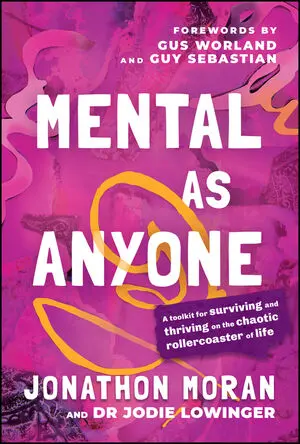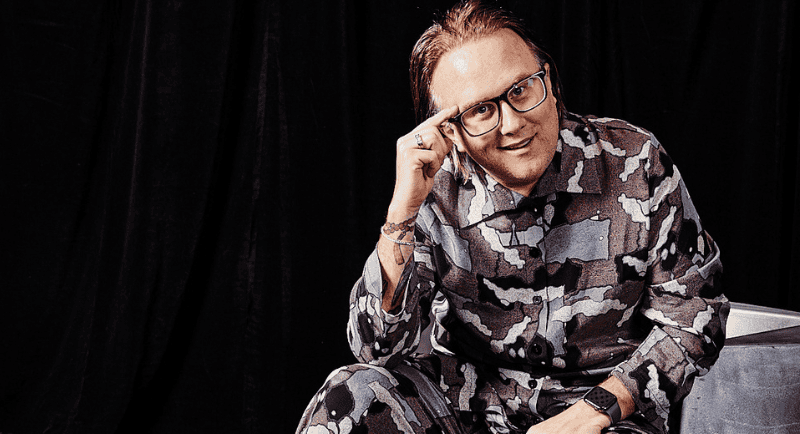There’s a long-standing rule in journalism: never make yourself the story. But what happens when the story you’re telling is so deeply tangled in your own experience, it becomes impossible to separate the two?
That’s the crossroads I found myself at while writing and producing this week’s episode of Mediaweek’s Newsmakers podcast.
The guest? Jonathon Moran or JMo, as most in the industry affectionately know him. Most people know him as a seasoned entertainment journo and podcast host. But to me, he’s someone I’ve known since childhood, in a way that defies the usual boundaries of a professional interview.
We first met when I was working as a young actress on a television show called Always Greener. JMo, already making his mark in the media world, took me under his wing. Not in a fleeting, polite way, but in the quiet, enduring manner of a big brother you didn’t realise you needed. I adored him then, and I still do now.
This isn’t just an interview. It’s a conversation layered with shared history, deep admiration, and a raw look at the personal battles JMo has chosen to bring into the light in his new book Mental As Anyone.
Natasha Lee: You spent years telling other people’s stories. What did it feel like to sit down and tell your own finally?
Jonathon Moran: Honestly, my thoughts were, will anyone give a s**t? But it doesn’t matter at this point, as it’s coming out.
Obviously, someone else saw something in it, too. The idea started with my podcast, ‘Mental As Anyone’, and that’s the theme of the book. I hope that through telling my stories of my life, hopefully, one person or multiple people will feel less alone in the fact that they, too, may relate to some of those stories.
The incredible, the incomparable Dr. Jodi Lowinger, from The Anxiety Clinic also came on board for the book, and has written a toolkit for those who either relate or for those that are going through their own issues.
There’s no book like this on the market. I call it a memoir meets self-help.
NL: I’ve known you since I was 14 years old and working on a TV show. You really were the first friend I made in the industry and you[‘re probably my longest friend
JM: Oh really?
NL: Yes. You got my parents’ approval pretty quickly, and then we went everywhere together.
JM: I was very protective of you in those early years, because I saw perhaps I saw in you a fragility that I see in myself, and I didn’t want you to be taken advantage of. I wanted to look after you.
NL: You have always radiated such a positive energy and always seem so happy – have a lot of people been surprised by your confessions in this book?
JM: I think we all live with demons, so you know I know you live with demons, and this is not me asking you about yours, but I know.
NL: We all do.

JM: I’m not unique. I’m not special. I don’t pretend to be. My job doesn’t make me special because I’m in the media or I do TV radio, or because I write for the biggest newspaper in the country. One of the things people said to me when I said I was writing a book was “you should do a celebrity, tell all”.
NL: Do you reckon there is a bit of like a symbiosis between those people who suffer from the kind of mental health issues you talk about and those in media, particularly celebrities?
JM: I think the media is in large part run by men traditionally that are of a certain age, and those men didn’t talk about their feelings, but those things are changing.
The team here at The Daily Telegraph, especially my editor Ben English and Anna Caldwell, who is the editor of the weekend papers here at the Telegraph, done nothing but encourage me to be open and honest and and raw, and so on, and and I don’t think that would have happened 20 years ago.
That said, I don’t think media’s anymore screwed up than the rest of the world.
NL: I have a theory that a lot of people that are in the media because they like that adrenaline and that the industry it really does kind of attract personalities that like that rush – do you agree?
JM: Yeah, I’ve also got ADHD. So I find it hard to focus. I’m also a news, junkie. I listen to the ABC radio in the morning. I love AM and I love PM radio because it just gives me a snapshot of what’s going on in the world.
NL: You wrote that you never felt good enough ever – do you think that writing the book has helped to ease that?
JM: Not yet no.
NL: Do you think it will?
JM: I just have imposter syndrome, and I don’t think that’s unusual. I think a lot of people do. Logically, I know I’ve done a good job, and the fact that it’s been published… I man getting a book published is not easy.
The publishing team at Wiley have been incredible. They believe in me. Jordon Lott there has just been insanely amazing. But inside I’m like, were they just being nice to me?
NL: What do you hope the book does for somebody who might be experiencing that kind of darkness that you talk about?
JM: It’s just really simple. I just want people to feel less alone. It’s as simple as that.
Mental As Anyone is available to buy now.
If you or someone you know needs help you can call Lifeline on 13 11 14.
